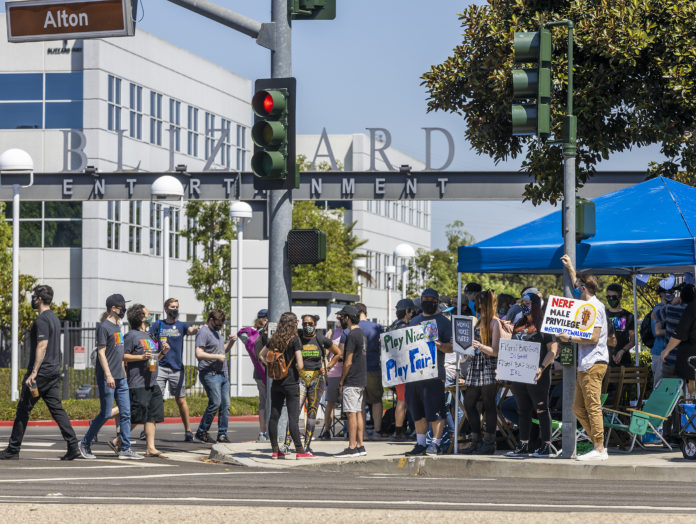Activision reported $2.3 billion in quarterly revenue on Aug. 4, one week after it was rocked by a high-profile lawsuit brought by state regulators over alleged pay discrimination and sexual harassment.
The earnings landed as Activision reckons not only with the legal challenge but also the fallout. Two key executives — including Blizzard President J. Allen Brack — have exited the company, and several hundred employees staged a walkout at the company’s Irvine offices over management’s handling of the lawsuit.
On July 28, the day before the walkout, Activision stock dropped 6.7%. The price had not recovered by Aug. 4.
More than 2,000 employees have reportedly signed a letter calling the company’s response to the lawsuit “abhorrent.” In a statement, Activision initially described the state’s claims as “distorted, and in many cases false.”
At the start of the Aug. 4 earnings call Chief Executive Bobby Kotick attempted to address the allegations head-on.
“I want to start by making clear to everyone that there’s no place at our company where discrimination, harassment or unequal treatment of any kind will be tolerated,” he said.
No matter how strong Activision Blizzard’s earnings, Cornelio Ash, equity analyst for Playa Vista-based independent advisory firm William O’Neil & Co. Inc., said he had no expectation that the share price would bounce back.
“I think very little attention is going to be on the actual performance of (Activision Blizzard’s) games,” Ash said. “All of the attention is going to be on these headlines.”
Beating projections
Beating projections
The company’s earnings surged due to more than 450 million in nonreportable segment income and deferred net revenues.
Segment revenue, however, was down 7% from the same 2020 quarter at $1.84 billion in 2021.
The company’s Activision segment had 127 million monthly active users, an uptick from 125 million in the same prior year quarter. The segment’s revenue was $789 million for the quarter, down nearly 21% from the second quarter of 2020.
The Blizzard Entertainment segment also saw declines, making $411 million in the quarter, down 5% from $433 million in the second quarter a year earlier. It had 26 million monthly active users for the quarter, down 19% from 32 million the previous year.
King, the company’s mobile gaming segment, was the only one to see revenue increase year over year. The segment made $635 million in the quarter, up 15% from $553 million the year before. But the segment saw monthly active users drop 6% for the period, down to 255 million from 271 million the year before.
After the pandemic caused the gaming industry to boom in 2020, the previous year’s earnings have been hard to beat for many companies, according to Ash.
As the world begins to reopen and fewer people are opting for at-home entertainment, he said, many gaming companies have seen “lukewarm” earnings performance.
Though Activision Blizzard beat its previous year’s results, the pace of growth has slowed. In the second quarter of 2020, the company beat second-quarter 2019 earnings by nearly 40%.
“It’s hard to continue to grow with that clip because it was a one-time thing,” Ash said.
‘Frat boy’ culture
‘Frat boy’ culture
The suit claims the company fostered a sexist and “frat boy” culture where women, and especially Black women, were paid less than men “doing substantially similar work,” were promoted less frequently than men and assigned to lower-level jobs. The suit also alleges “constant” sexual harassment, where women were subjected to “groping, comments and advances.” It claims executives and human resources personnel were made aware of the conduct but failed to prevent it.
Brack was named in the complaint. On Aug. 3, Blizzard Entertainment announced he would step down and be replaced by Jen Oneal, Blizzard’s executive vice president of development, and Mike Ybarra, executive vice president and general manager of platform and technology.
According to the Wall Street Journal, Jesse Meschuk, Activision’s senior vice president for global human resources, has also departed.
Brack said in a statement that Ybarra and Oneal will provide leadership that Blizzard needs to “realize its full potential.”
Activision Blizzard also faces a lawsuit from a shareholder accusing the company of withholding information about the state’s investigation, which went on for two years. Proposed as a class-action case, the shareholder’s suit was filed in the U.S. District Court for the Central District of California by New York-based Rosen Law Firm.
Moving forward
Moving forward
The company said it will also ensure compliance with recruiting diverse candidate slates and make changes to in-game content deemed inappropriate based on input from “employee and player communities.”
“When we come together, we make some of the best games in the industry, and we’re now seeing that energy applied to our culture, which is equally important,” Oneal said on the Aug. 4 earnings call.
The company has also enlisted Washington, D.C.-based law firm WilmerHale to review of its internal policies and culture, and encouraged employees who have experienced workplace policy violations to report them to the firm.
In the employees’ letter to Activision Blizzard management, signatories rejected the company’s decision to hire WilmerHale, saying the firm has a history of “discouraging workers’ rights and collective action.”

